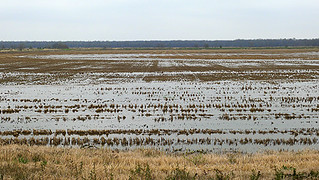Freeze may affect fruit trees, wet weather may delay row crops
LONOKE, Ark. – The spring’s yo-yoing temperatures may take a bite out of fruit yields this year, while the on-again, off-again spigot may throw row crop planting behind, say extension agents for the University of Arkansas System Division of Agriculture.
“We endured brutal cold temperatures in northwest Arkansas, with several nights right around zero or below, and I anticipate some cropping issues as a result,” Neal Mays, Benton County extension agent. “For fruit crops, we will soon see how much bud injury has occurred, but the extreme cold weather very likely killed a percentage of fruit buds, which will affect yields.”
The cold may also affect some pasture in an area that’s had its share of forage-killing drought.
“The ground was frozen at least a foot deep multiple times and for several days each time,” Mays said. “Some winter injury or death is probable in bermudagrass pastures and hay meadows.”
The livestock situation was a little brighter in Boone County.
“The frequent showers we have been experiencing are a blessing in cattle country,” said Mike McClintock, Boone County agent.
‘The rain along with cool temps have delayed forage growth, slowed fertilizer applications and slowed spraying pastures for thistles and weeds. But the grass is starting to grow and the ponds are full -- we are happy!”
The storm system that moved through Arkansas Thursday and into Friday morning, downed trees in numerous counties and damaged homes in Pike County. It also brought hail up to 3 inches in diameter and plenty of rain. While delays are inevitable with more rain on the way, no one is in panic mode yet.
“We received 1.5 inches of rain earlier this morning,” said Scott Stiles, extension economist based in Jonesboro. “There's another good chance of rain on Sunday – 70 percent -- and again on Tuesday.
“The current outlook has field conditions remaining wet over the next seven days,” he said. “Temperatures are dropping behind this front. Locally, we're expected to drop down to 38 tonight (Friday). Lows will stay in the 40s for the upcoming week, with highs reaching 60 at best. Looks like planting will be on hold for maybe a week – at least in this area.”
In Phillips County, “farmers here started planting for, rice and even soybeans late last week,” said Robert Goodson, Phillips County extension agent. “Rain ranged from 2-3.75 inches last Friday and while producers are excited to plant, it's still early in planting season, it’s only April, and we have plenty of time yet.”
In southern Arkansas, Calhoun County Extension Agent Jaret Rushing said, “The wet weather down here hasn't been as big of a factor as the frost. Many people are behind on getting their potatoes, onions and other winter crops in the ground because the bitter cold spells we had up until two weeks ago kept killing back the forages.”
In Prairie County, some of the spring planted crops are starting to peek through the soil.
“I stopped and looked at couple rice fields on the way home and they have sprouted,” said County Staff Chair Brent Griffin. Michael Paskewitz, an agent also in Prairie County, “looked at several corn fields around Des Arc and reported half-inch sprout.”
“When the fields do dry out, it’ll be ‘Katie bar the door’,” Griffin said. “Farmers are watching recent spikes in commodity prices to take advantage of covering production costs.”
Keith Perkins, Lonoke County extension agent, cited the observation of his father, a long-time farmer, on Nature’s ups and downs: “My dad would always say, ‘I haven't missed a crop yet’.”
For more information about crop production, visit our newly revamped site at www.uaex.uada.edu and http://Arkansascrops.com.
The University of Arkansas System Division of Agriculture offers its programs to all eligible persons regardless of race, color, national origin, religion, gender, age, disability, marital or veteran status, or any other legally protected status, and is an Equal Opportunity Employer.
By Mary Hightower
The Cooperative Extension Service
U of A System Division of Agriculture
Media Contact: Mary Hightower
Dir. of Communication Services
U of A Division of Agriculture
Cooperative Extension Service
(501) 671-2126
mhightower@uada.edu
Related Links
